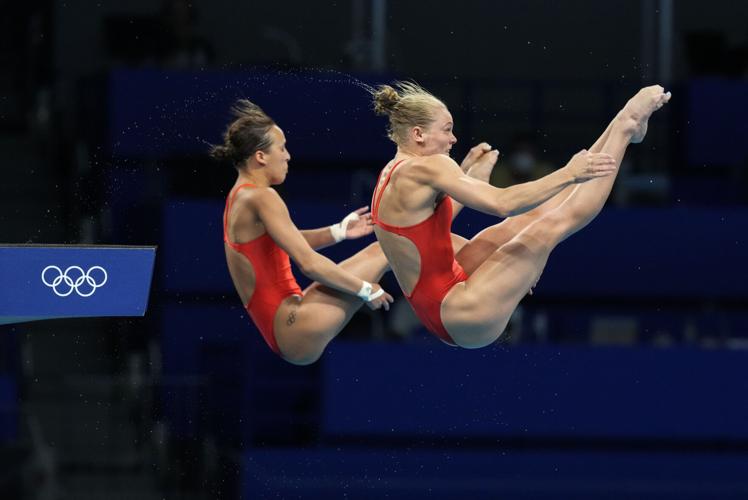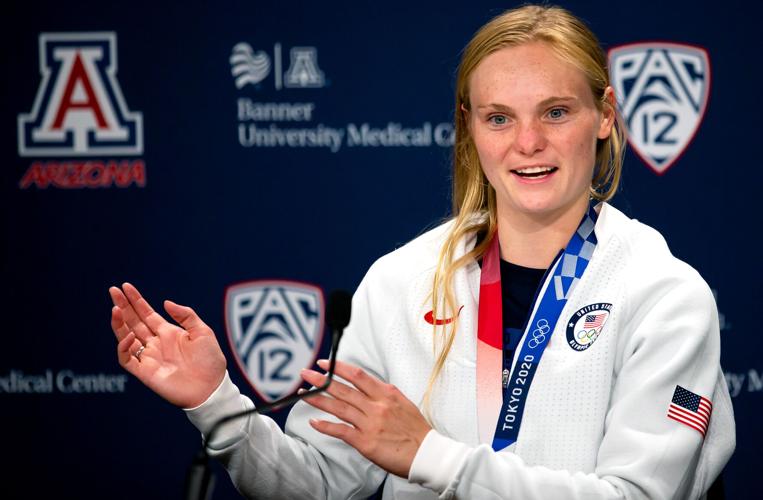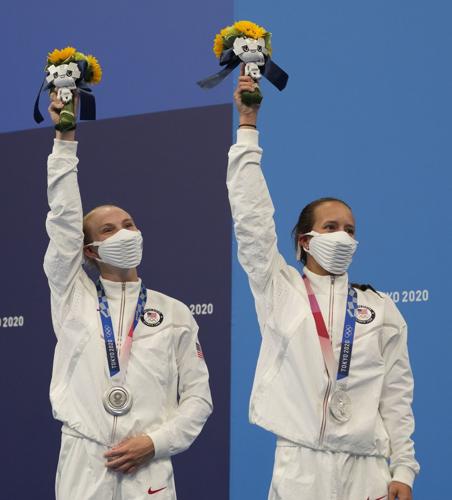Delaney Schnell, Arizona graduate student and platform diver extraordinaire, will represent one university during the 2024 Summer Olympics. But thanks to the realignment calendar, Schnell could earn medals for two conferences during her fortnight in Paris.
The Pac-12 has left us with one last quirk before it departs the stage.
The conference did not officially disintegrate on July 1, the start of the fiscal year and the standard date for schools to change conferences.
Instead, the 10 departing universities will remain members through the close of business on Aug. 1 — a date established during the negotiated settlement with Washington State and Oregon State that tracks with the expiration of the conference’s grant-of-rights contract, which was signed by the 12 schools more than a decade ago.
There are 262 athletes (current and former) competing in Paris from the 10 outbound universities, according to the NCAA. They will represent the Pac-12 for the first nine days of the Olympics and their new conferences for the final 10 days.

Jessica Parratto and Delaney Schnell of the United States' compete during the women's synchronized 10-meter platform diving final at the Tokyo Aquatics Centre at the 2020 Summer Olympics on July 27, 2021, in Tokyo. The pair won the silver medal.
Within that circle of strange, Schnell’s situation stands out.
Her first event, the synchronized 10-meter platform dive, will award medals on July 31, the penultimate day of the Pac-12’s official existence. (She won silver in Tokyo, by the way.) But the final for Schnell’s other event, the individual 10-meter platform, will take place on Aug. 6, the fifth day of Arizona’s official membership in the Big 12.
How will posterity define her conference affiliation?
The Big 12 plans to claim Schnell — and every other athlete representing Arizona, Arizona State, Colorado and Utah — as one of its own regardless of the date of competition.
The Pac-12 is merely wishing the 262 athletes well.
“We’re excited to celebrate the many Olympians who have come through Pac-12 athletics programs in the Paris 2024 Games,” the conference said in a statement provided to the Hotline.
“Though celebration of Olympians from our 10 departing schools is more appropriate moving forward for the platforms of each institution’s new conference, we will proudly root for Olympians made here!”

UA alum Delaney Schnell shows off her Olympic silver medal from the 2020 Tokyo Olympics. The games were delayed a year due to COVID-19. Schnell won the medal in the women’s synchronized diving 10-meter platform competition. The Tucson High School alum will compete in both the 10-meter synchronized and individual platform dives this year in Paris.
That approach seems to suit all purposes.
In practical terms, Aug. 2 carries no competitive significance; it’s just a date on the calendar that happens to fall during the Olympics.
The 10 outbound schools have been active participants within their new conferences for months, attending meetings and representing their new homes publicly.
Coaches and players for the Four Corners schools attended the Big 12’s football media event earlier this month in Las Vegas, for example. Oregon, UCLA, USC and Washington are doing the same with the Big Ten edition this week In Indianapolis. Cal and Stanford are attending the ACC’s event in Charlotte.
Meanwhile, the remaining entities within the Pac-12 — and by that we mean Washington State, Oregon State and the conference office — are looking ahead.
The conference website, revamped this summer, displays content on the Cougars and Beavers but makes no mention of the 10 departing schools even though they are members for another week.

Jessica Parratto and Delaney Schnell of the United States’ react after winning silver medals during the women’s synchronized 10-meter platform diving final at the Tokyo Aquatics Centre at the 2020 Summer Olympics on July 27, 2021, in Tokyo.
Instead, their new leagues are filling the void.
The ACC welcomed Cal and Stanford on July 1, to coincide with SMU’s official arrival.
The Big Ten issued a news release about its Summer Olympians on July 10 and included athletes (current and former) from the four new schools.
And the Big 12 will promote Schnell, along with every athlete from the Corners schools, whenever the opportunity surfaces.
“The Big 12 plans to celebrate the achievements of the Olympic athletes from all 16 of our schools moving forward,” a source said.
The approach flows from a joint decision made earlier this year by the ACC, Big Ten and Big 12 to count draft picks (NBA and MLB) from the outgoing Pac-12 schools as their own.
And why not? Somebody has to claim the athletes for posterity.
Olympic medal counts occupy a smaller slice of the college sports narrative than draft selections; they are a source of pride for conferences every few years.

Arizona's Delaney Schnell is a Tucson native, Tucson High graduate, Pac-12 Diver of the Year and Olympic silver medalist. She's in Paris aiming for more hardware this year at the 2024 Olympics.
(Both medal counts and draft picks are getting more complicated to track because of the transfer portal.)
And it’s not like the athletes themselves lack public relations support. If Schnell medals, Arizona will blast the news from coast to coast, the U.S. Olympic Committee will do the same, and NBC will make sure every eyeball sees her in action.
Whether Schnell’s success comes before or after Arizona’s official move into the Big 12 doesn’t much matter.
But the quirk that makes it all possible — the oddity of an Aug. 2 transition date — is so very, very Pac-12.







